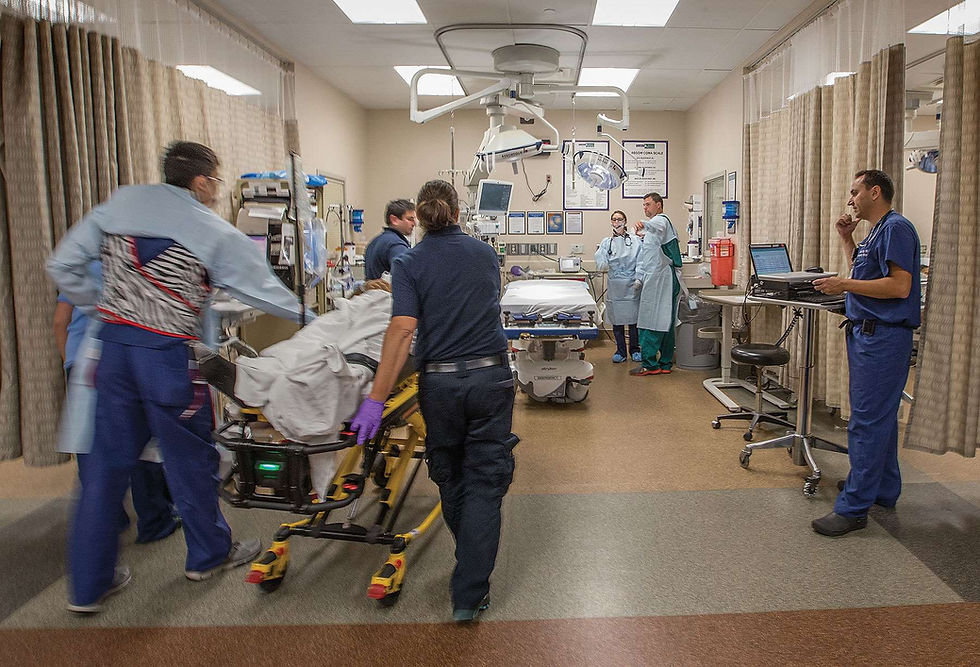I was fortunate enough to grow up with a physician in the house. Which also meant I could never play sick to get out of school. My dad stayed home anyway which was no fun even if you missed school. We were confined to our bedrooms. No watching TV when you were sick at home.
But the good news is, I grew up with a good idea of when a true emergency was happening or not. Mostly, not. If fact very few things warrant going to the emergency room - even urgent care. More times than not, people freak out when something is wrong, different or uncomfortable.
Many of my friends have been to the emergency room for things that were so obviously not emergencies. They grew up being taken to the emergency room for cold and broken arms and then have become adults that go to the emergency room for every fever.
I kinda grew up under the assumption that unless there was an excess of blood or a lack of oxygen, examine the issue before next steps are taken. Don’t rush to the emergency room.
The ER habit that many people have is clogging up the medical system. It is also WILDLY expensive to get treated in the ER. Treating allergies in the ER costs about $350 where as the same treatment would be 97 bucks at an urgent care. Strep throat cost about $550, an upper respiratory infection about $500 and a urinary tract infection is upward of $660. All three of these can be treated at an urgent care clinic for about 100 bucks.
Remember, I’m a big fan of cash paying patients and private, competitive medicine so price shopping is important to me in regards to medical care. Many insurance companies have strict policies when it comes to ER visits, so know what your provider is willing to cover and how much. Chances are, you’ll still get footed with a big bill.
Let's talk about when we should visit these places

Emergency Room
Going to the emergency room is no joke. This is a fully equipped trauma center. Out of respect to the doctors and those who are really in need, don’t come here unless your life or health is seriously in danger.
Also, don't complain about the wait time. Bottom of the roster is exactly where you want to be when visiting the ER. People die near daily in there. Your broken arm can wait.
Chest pain or difficulty breathing
Deep knife wounds or gunshot wounds
Fever in a newborn less than 3 months old
Stroke symptoms, such as vision loss, sudden numbness, weakness, slurred speech, or confusion
Severe abdominal pain
Fainting/change in mental state
Serious burns
Poisoning
Head or eye injury
Concussion/confusion
Broken bones popping through the skin and dislocated joints
Fever with a rash
Fever over 101F/38.3C
Seizures
Facial lacerations
Vaginal bleeding with pregnancy
Urgent Care or Retail Health Clinic
There are extremely helpful places. If it is after hours and you can’t reach your doctor for a prescription, this is the place to come.
I know if you're a parent and you have a sick or injured kid, it is hard to be objective as to what is an emergency and what needs urgent medical care. Try to take a step back and evaluate. This list will help you
Accidents and falls
Cuts that don’t involve much blood but might need stitches
Breathing difficulties, such as mild to moderate asthma
Diagnostic services, including X-rays and laboratory tests
Eye irritation and redness
Fever or flu
Minor broken bones and fractures in fingers or toes
Moderate back problems
Severe sore throat or cough
Skin rashes and infections
Sprains and strains
Urinary tract infections
Allergic reactions
Vomiting, diarrhea, or dehydration
General Practitioner/Walk-in Doctor
Your personal doctor can help you with a lot of day to day health issues. Your GP will be the gateway into the health system so make sure you have a good one. This is also the person who keeps your medical records.
There is a fair amount on danger going to the ER or UC because they don’t know your medical history. Unfortunately there have been many cases of a patient reacting negatively to a medication an ER doctor gave them because there is no record and no communication with a GP about the patient's history, allergies or current medication. That's another reason to cut down on emergency visits.
If you do wind up in the ER or UC, be sure to communicate your doctors contact information and even alert your doctor to the visit yourself. This way, they can get it on record and work with the ER docs to get you covered properly
Here's where your doctor can help you:
Cough, cold, flu
Ear infections and sore throat
Minor injuries like sprains, bumps and bruises
Skin problems
Urinary tract infections
In addition, your GP can facilitate you care for chronic diseases
Allergies and asthma
Arthritis
COPD
Heart disease
High blood pressure
Diabetes and obesity
Substance abuse
Here are some good and clear resoures:
https://www.solvhealth.com/blog/guide-to-navigating-an-urgent-care-visit-without-insurance
https://www.healthedeals.com/blog/save/whats-the-difference-between-the-doctors-office-urgent-care-and-the-retail-walk-in-clinic/
https://www.bcbs.com/articles/know-where-go-how-choose-between-doctors-office-urgent-care-and-er
https://www.scripps.org/news_items/4231-should-you-go-to-the-emergency-room-or-urgent-care
https://www.mountsinai.org/locations/urgent-care/what-is-urgent-care
https://mdpremier.com/broken-bones-urgent-care-or-emergency-room/
